The lights have dimmed. The smoke has vanished. Brother Ali has left the stage. A crowded club in Santa Monica, California has just seen him premier new songs off his upcoming Mourning In America And Dreaming in Color LP and that packed house ain’t emptying out. As promised, Ali reemerges from the back with a bottle of water, a box of CDs and a confident grin. Literally taking a seat center stage, Ali greets supporters for over an hour. He shakes hands, listens to fans’ heartfelt, often lengthy personal stories and he answers their every question with thoughtful responses before posing for cell phone picture after cell phone picture. With every flash, he remains focused, grateful for every hug and compliment. “Thank you,” he says. He means it.
That gracious approach may be a result of Ali’s story-filled journey. His professional road began, interestingly enough, with Rites of Passage, released in 2000. Then, backed by Minnesota’s Rhymesayers family, he unleashed 2003’s Shadows On The Sun to critical praise. Songs like the love-thyself anthem “Forrest Whitaker” and the intensely personal “Picket Fence” revealed much about his unique story that also seemed to connect with a growing underground Hip Hop fan base, making people line up for an autograph, a handshake and some merch. This was further accentuated by his follow-up, 2007’s The Undisputed Truth, which also garnered critical acclaim. With tracks like the daring “Uncle Sam Goddamn” and the loving “Faheem,” an emotional ode to his son, Ali cemented his spot as a revealing emcee, willing to take fans into his journey, his painful divorce, his trials with his mother, his childhood fights and his renewed joy when finding his “Puerto Rican mami.” No subject seemed off limits. “Had some of y’all concerned for my life for what I’ve had the nerve to recite,” he admitted on “Lookin’ at Me Sideways.” That type of candor allowed fans to become even more connected to a man who calls himself Brother. So it makes sense that the fans stay after shows in this manner, as if to say, “Thank you for sharing your story. Now, we’d like to share ours with you.” So, he listens.
Listening to others was the theme on 2009’s Us, where he still spoke about his own life, sure, but he also became more active in reaching his 2003 goal to “speak for the voiceless.” Us was about the plight of everyday people, the saddened immigrant, the shunned gay teen and the abused young woman, among others. Us was perhaps a prelude to the social issues he has focused on with Mourning In America And Dreaming in Color. “On this album, it’s a little step further than that,” he shared with me before the aforementioned show in the packed club. “I would stop short of saying it’s going to be a political album. I don’t think it’s that. Political music talks about specific politics and policies. I think this album is really social and really talking about things that I care about in society.” Inspired by social justice, he is ready to continue his journey and he’s got some more stories to share.
Brother Ali On Mourning In America And Dreaming in Color
HipHopDX: This evening you’re playing some of the new material. So, I wanted to get your take on the direction of the new album, where you feel this is taking you in your career and what kind of emotions come to mind when you think about what this is going to bring to your fans.
Brother Ali: Everybody talks about growth, everybody that has a long career. When this record comes out, it’ll be my sixth one and I’ve been making albums for 10 years now. I think if you look at my growth, it’s been a personal growth. I started out as a youth. You add the T.H. to the end of something and that’s what that thing is about. In your youth, you’re just all about yourself. You’re just trying to figure out how to live in the world. You’re just trying to figure it out. You’re just trying to live life. You’re really focused on self. As you start to grow, you start to think about family and eventually you start to think more about your community. Hopefully, as we grow and mature, we become more stable and the everyday living of life becomes less of a focus. You pretty much learn how to live life so then you’ve got time to focus on your family. You start to think about community and that’s where I am. If you look at Shadows On The Sun, I was really just focusing on trying to survive, literally, you know, starving, and living in the hood just trying to make it. That album did okay and we got some love, some support. Then, I got to a point on Undisputed Truth where I was thinking more about spirituality and living the way I wanted to live. Shadows On The Sun was just trying to live and then on Undisputed Truth, I started thinking about how I could choose how to live. That was new to me. On the Us album, I started to think more about the effect that the music was having on people. I was trying to tell stories of different walks of life, trying to bring people together. On this album, it’s a little step further than that, talking about society and this kind of new, deeply democratic feeling that exists in the world. I would stop short of saying it’s going to be a political album. I don’t think it’s that. Political music talks about specific politics and policies. I think this album is really social and really talking about things that I care about in society.
DX: Social justice?
Brother Ali: Yeah, I would say so. I mean, it’s tough because with all of this stuff, I try to approach everything in my own way, according to my own personality. When you start talking about political music or conscious music or whatever, you automatically think of Public Enemy. You automatically think of dead prez. You automatically think of [Talib] Kweli and they all have done those things in really incredible ways that I wasn’t trying to replicate or duplicate. I had to think about, “What do these things mean to me? How do I relate to these issues?” So, I really tried to approach it from a really personal point of view.
DX: What has been the feedback you’ve received from those around you, those who have heard the album? The last time we spoke, you also said you shared some of this album with Dr. Cornel West and perhaps you’ve shared some of it with folks like Chuck D. What have they all told you about this project?
Brother Ali: It’s been really great. [Dr.] Cornel West is on the album. I went to spend a day with him and recorded him. Now, when I say a day, I mean 11 in the morning ‘til midnight. That was really incredible. He gave me a lot of game – not even game – game isn’t even the word. He gave me a lot of wisdom and a lot of advice. There are certain sheikhs in the Sufi tradition of Islam and just from talking to you or interacting with you for a short period of time, they know who you are, they know your soul and they can give you advice to help you navigate things. That’s what [Cornel West] did. He really did that. I felt like within an hour of talking, he knew exactly who I was, in a really deep level. It was really great.
I make my albums to try to feel good, to try to satisfy myself. I know what’s going on inside me. There’s always a lot going on in my head and heart. I want to make an album that sounds like that and reflects that. So, when people listen to it, they’ll get a sense of where I’m at and what I’m most passionate about right now. I judge the albums based on that. I base it on, “Am I expressing where I’m at and what I care about most in a way that listeners can get it?” After that, obviously, “Are the beats good? Are the raps good?” You have to think about that but it’s more about, “Do I express this?” [Pointing to heart] I think so. I really do. I’m just now starting to hear the songs mixed by legendary engineer Eddie Sancho, who mixed all of [DJ] Premier’s stuff. He mixed [The Notorious B.I.G.’s] “Kick in the Door.” He mixed “Unbelievable.” He mixed “So Ghetto” by Jay-Z. He mixed the last few Gang Starr albums. I met him through Evidence. He mixed all of Ev’s stuff. So, I’m starting to hear mixes and I’m just now starting to play it for people. The response has been really great but I know I did exactly what I wanted to do. It came out better than I thought it would, honestly. It’s, at minimum, one of my best albums. It might be the best one, though. It really might be. There are people that love certain albums, you know. There are people that love Shadows On the Sun, Undisputed Truth or Us, but there are people that are going to think this one is better and I can’t say they’re wrong.
Brother Ali On “Writer’s Block,” Working With Jake One
DX: What do you attribute that to?
Brother Ali: [Pausing to think] Just getting older and getting better at expressing myself and getting better at rapping and trying different styles. It was really good that, you know, 2010 was a big year of change for me. My deejay that I worked with forever [DJ BK-One] retired from the road. Then, Ant made two Atmosphere albums and toured for two years. So, I wasn’t able to work with people I always worked with. Then, even my engineer – I made all of my other five albums with the same engineer. Same producer, same engineer and same deejay performing it so it was like the same team of people. None of them were able to do this one. So, I worked with all new people and it made me have to approach things in different ways. I tried to make them come in my direction and I had to go in their direction. So, I’m flowing different ways, my cadences are different. Jake [One, who produced this album] is really big on cadence. Ant is all about mood. So, as long as the mood is right, he doesn’t even necessarily always listen to the words. He knows when they’re good or they’re not good but he can’t recite the words to anything. Jake is all about flow. I’ll send him a song and he’ll send me back specifically, “At 1:29, you get off a little bit. At 2:04, you get off a little bit. You got too many words, fix that.” He’s a very specific technician with that stuff, so it’s dope. It’s really good.
DX: As a writer, that must have been a little bit more of a challenge, something outside of your norm.
Brother Ali: Yeah. He’ll straight up say, “You did the same flow on the last two songs.” Or, he’ll say, “You’ve got three songs with the same flow. You gotta lose two of them. Pick the one you like the most because you can’t flow the same way.” So, that was really different.

DX: Listeners can hear some of that on The Bite Marked Heart EP. Speaking of that EP, you were very deliberate about taking songs off your next album, Mourning In America And Dreaming in Color to put them on this EP because you didn’t want to “flood the blogs” or “the streets” too much, like you say on “Writer’s Block.” What do you feel that selective process did to Mourning?
Brother Ali: It made it stronger because normally, [it’s different]. That song, “Writer’s Block” is kind of about the fact that I had to overcome that because I did my album in Seattle. It costs a lot of money to go to Seattle. You know what I mean? So, I’m sitting in a hotel room with this idea in my head, this album I want to make. Normally, when I’m at home with Ant, I’m thinking, “I need to write a song about this, one about this and one about this.” If I’m not doing those exact songs, I just don’t do anything. But I’ll go way too long between albums doing that shit, you know? So, this time, Rhymesayers [Entertainment] flew me out to Seattle and got me an apartment. You know, Rhymesayers are spending thousands of dollars for me to be here. I can’t just wait until the perfect song is in my head like I normally do. But, I can write a song. It might not be the song that I have in mind but I can write a song right now and I can feel like I’m doing something. That’s where a lot of these things that we’ve been leaking come from. “Writer’s Block” was one of those. “Writer’s Block” was literally me being like, “I can’t write the song I want to write so let me write a song about not being able to write the song.” I know all of the Jake One things that are on there [points to physical copy of Bite Marked Heart], if I kind of look through them, “Shine On” was one I just made for fun. It was just a fun song. “Haunted Housebroken” is a song I made before I really knew what kind of album I was gonna make. So, all of these didn’t fit for one reason or another. Mostly, they weren’t on the theme of the album. We did a lot of songs. I went out there [to Seattle] about three or four times and we had one particular trip out there where we had a weekend where we made like three or four songs that are on the album, Mourning In America And Dreaming In Color. We were like, “Okay, this is the sound! This is the topic! This is the feel! Now we’re making the album! These are the songs that are gonna be the skeleton of the album.” They ended up being that. So, all the songs before we hit that point, that’s Bite Marked Heart. But, we still got a whole bunch more songs. We made like, between 30 and 50 [songs] depending on how you count. Some of them, I’ll do a song and then I’ll be like, “That song’s alright but now I’m working on this cool one” so I’ll take a verse off that, put it on here. Some of them have the same verses and stuff but there are at least 20 songs that are great songs that aren’t on the album. So, we have enough to do another EP and we’re gonna be leaking more things just kind of leading up to the release, more videos and songs that we thought were kind of fly but just not for this album.
Brother Ali On Impact Of Trayvon Martin, Occupy, And Potential Backlash
DX: You talked a bit about progression. Shadows on the Sun seemed like, “Meet Brother Ali and empathize with his story.” Then, as you got older, it seemed like Us was a calling to fans, asking everyone to look around at others’ lives. From my understanding, Mourning In America And Dreaming In Color is meant to make people look at themselves and at how society makes people act, feel or view the world. Is that a true statement, that this album will put a mirror in a lot of peoples’ faces? If so, how?
Brother Ali: I think we all have to be in the mirror. We all have a lot of soul searching to do in this country. “Mourning In America,” to mourn, and “Dreaming in Color,” to dream, so, I think that looking in the mirror, we have to come to grips with a lot of realities. We have to grow up and mature a lot as a society. Circumstances are forcing that to happen right now. The economic times we’re in are forcing us to look at ourselves and look at each other. Then, the “Dreaming in Color” part is about looking at the possibilities that are there. We’re going through a time of change. We’re in a time where our country and our society is changing. It’s undeniable, it’s impossible to ignore and it’s unavoidable. What we need to decide is what’s gonna be our role in that. The Trayvon Martin [murder] was such a great – not great in the sense that it was a good thing but great in the sense that it was big in American life in terms of what it symbolizes and the conversation that has come out of it has been really revealing. I was raised in a way where racial justice was always in the center of my life, always. It was a number one theme in my life. That led to me caring about justice for everybody but racial justice is what brings me to this. So, I’ve always been talking about this. The consensus lately, especially amongst privileged people is that, “It’s okay, racism is over. We’re post-racial. We’re colorblind. We got a Black president.” But these issues didn’t go away because we have a half-Black president, or a not-completely-White president. The issues are still there and they’re still really big. But, things like this Trayvon thing have forced these conversations to happen again. We see people revealing things that I don’t even know if they knew about themselves. The reality is that this country isn’t going to be majority-White for much longer. Sorry [smiling]. Sorry, it’s just not. So, what is it gonna mean for our country to have more than half of our society come from being marginalized, oppressed and kept out? The country can’t survive like that. This economic situation, the recession, has been pushing people into the gutter. Now, we’re all in the gutter together. So, we have things like the Occupy movement. If you were to go to Occupy in any city, you’d see a majority, young, White, used-to-be middle class demographic of people out there like, “Woah, what the fuck’s going on? We need to start talking about this.” People talk about how [Occupy participants] don’t know what they want. They do know what they want. It’s just that we haven’t been engaged in this kind of dialogue or soul searching since the ’60s. We have a whole generation of people that have never been out in the street. So, Occupy is really saying, “We’re gonna take these public spaces and we’re gonna designate them as spaces for people to come and meet to talk about how we can change the injustice that’s going on in the world.” These are great examples of how negative things, which have negative effects, are also pushing people together, putting everybody in the same boat. To me, that’s the Dreaming in Color part. They always say it’s gonna get worse before it gets better. I think this is the time of the “worse before it gets better.” I think we’re close to that. We haven’t hit it yet. It’s still gon’ get worse but it’s inevitable change and we have to decide where we fit into that. Are we quiet observers that just watch it go down? This is the world we have to live in. This is not popular and it’s not a way to attract people to music, to start talking about political shit. It’s not. All the people that are really involved in activism are broke and they’re gonna download my record. So, it’s not a business move. I don’t know what kind of career move it’s gonna be. But it’s the truth. This is the world we have to live in. We’re going through a time of change. We either watch it happen or we figure out what we’d like it to look like and what we’d like it to feel like.
DX: You just said you don’t know what kind of career move this is gonna be. When you said that, you had a look like, “What might happen?” What do you think might happen?
Brother Ali: I could get a whole lot of backlash. I do get a whole lot of backlash every time I speak out about something. I think that there are people who listen to me or who started listening to me and us, a lot of the artists that are kind of in my category, because there were finally great Hip Hop artists that looked like them. When we’re in a privileged, dominant mainstream group, we don’t really unpackage these ideas and really think about, “What does that mean? Why?” We just kind of see these people and we make them heroes because we feel like, “They’re representing us.” Now, if that hero starts challenging you, you’ll be like, “Wait, this isn’t the role you’re supposed to be playing in my life.” That’s not the majority of the people that listen to me, by a long stretch. The majority of the people that listen to me do so because they hear me being sincere. They hear that I’m very sincere. Everything in all of the music is exactly how I am. Anything that’s not in there yet is because I haven’t learned how to do it yet. I’m still trying to figure out how to put certain parts of my personality in there to make good music out of it. But, the majority of people that listen to me can hear I’m really sincere and they hear me trying to figure it out and they’re trying to figure it out, too. But, there is a group of people that might leave me. There are some people that might leave me because of this.
DX: You really think so?
Brother Ali: Definitely, I think so. Also, some people just don’t want to hear that shit. In one of the main songs on this album, I say:
“I know that the masses want to sleep
And they’d just rather hear us rapping to the beat
But I want to pass this planet to my son
A little better than it was when they handed it to me”
There’s a lot of people where that’s not why they listen to music. They just don’t want to hear all that shit. Like that Tyler, the Creator line, “I don’t listen to the Immortal of Tech of the nique.” [Laughs] You know? There’s a lot of people that just don’t want to hear it. I know that.
But my friend Eyedea died. In terms of Underground Rap, he was it. He won every battle there was. He was highly respected and was making good music. He had a great touring career. A lot of guys do the battling but can’t do the music thing too. He was doing both and doing great. People loved that shit. People loved Eyedea & Abilities. But, he got to a point where he didn’t feel like rapping was completely expressing who he was. He was like, “I’m gonna stop rapping maybe forever. I’m going to learn how to play instruments and that’s what I’m gonna do.” He did that and eventually incorporated the two together in the By The Throat album, but he really did what he felt he needed to do at all times to really express himself. That means something to me. The fact that he’s gone really reinvigorated my commitment to always being honest and to always making music about what I care the most about.

Brother Ali On His Father’s Passing & Carrying The Legacy Of Nina Simone
DX: Earlier, you said that a strong theme in your life has been social and racial justice. But, there’s always an awakening period to that sort of activism. When was your awakening and how was it strengthened through personal experiences?
Brother Ali: That’s a great question and I actually just kind of realized this yesterday. I did a European tour in the summer of 2010. That was the first tour I did with none of my old touring buddies. That’s when it was official that Ant and I weren’t making an album together. BK-One officially retired and this was our first tour away. Even my tour manager, that I always worked with, [was away]. Those people are your family. You’re with them more than you are home. Out of that year, I toured 10 months so I was with them more than I was with my wife and kids. So, that was my family and they all, for one reason or another, couldn’t do that tour. So, I’m kind of by myself. I got great new people but they’re just not my regular crew. So, I really dove into reading. I read slowly because my eyes are so bad. My wife got me a Kindle so I could make the words bigger and it accelerated my reading through the roof. It used to take me a month to finish a book because I’d read until my eyes hurt and then I’d get a headache and then I’d have to stop for a day. So, the first thing that I read was Cornel West’s memoir [Brother West: Living and Loving Out Loud, A Memoir]. In there, he just talks so much about the connection between knowledge and activism and strengthening your morality through education. So, I decided that I was gonna try to read about every one of the people that he talked about. I was gonna try to read about all of these philosophers and everything he was talking about. So, I finished that and I started reading Karl Marx. At that same time in Europe, my dad died while I was on that tour. I came back and ended up having a week off in Amsterdam with some of my human rights activist friends. At that point, I realized I need to become more active, not just making music but I need to get in this fight in a more active way. So, I came back and put together the Day of Dignity, which was that free thing with me and Freeway and all of these services for homeless people and things like that, healthcare, food and medical supplies. Did that and then not too long after that is when the Occupy movement started up. Then, I got involved with that. Occupy Homes in particular, has spoken to me. Then, the conversation, you know Trayvon has helped the race conversation happen again. I think we need to seize that opportunity to really further that conversation.
DX: So, that’s when the awakening hit?
Brother Ali: Something about my dad dying, reading Cornel West and… Look, I was reading Cornel West and I was reading about when his dad died. Right then, I got to that point and I was backstage, about to go on stage. I read that and I just thought to myself, “Man, I wonder…” I just started thinking about when my dad gets old and dies. And right then, I got a phone call, “Your dad died.” You know what I mean? And I had to go on stage. Dr. West always says we have to decide what kind of people we want to be. On my album he says, “I can tell you want to be a person that leaves a mark on the world. You don’t just want to go through life sleeping. You want to leave a mark on the world.” And then [smiling, softening his voice], he says, “I understand. I want to be like that too.” So, it just really got me to thinking about my life. I’m still young. I’m just now really feeling like an adult. I’m about to get into my mid-30s and it’s like I’m just now starting to feel like a grown up. I’ve got a good 35 years of work left in me. What’s that gonna be about?
DX: It started sinking in?
Brother Ali: Yeah. I feel like I’ve had this weird race or this weird position in the racial chess game. I’ve been saying this but I spent half my life as a Christian and half as a Muslim, half my life in the hood and half not-in-the-hood, all White family, all Black community of supporters and friends. It’s very interesting, man. All of these things have happened for a reason. They’ve taught me a lot. Now it’s time for me to do something with what I know.
DX: It’s almost like “the old sister who hummed Gospel tunes” from “Picket Fence” who showed you the way. Now you’re trying to do the same for others, only you have Hip Hop.
Brother Ali: [Smiling] That’s really cool. That’s really, really cool. It’s funny because I was telling Dr. West about her. He said, “Brother Ali, what was her name?” I said, “I don’t have any clue.” I don’t even remember what school I was going to. I went to a different school every year. I don’t remember what school I was at. I remember the lunchroom. I remember her face. But I don’t remember her name or what school it was. I was telling him, it was almost like it wasn’t even real. She came to my life and set me on my path, in second grade. She basically taught me everything over the course of that year that I’m still living now.
DX: Now you’re doing the same?
Brother Ali: Yeah, in a way. Well, that’s the goal. That’s the job. Somebody does something for you, you have to carry that legacy. Another thing Dr. West said, he compliments people, but he said, “You’re carrying on a legacy. People like you and Immortal Technique are carrying forward the legacy of Nina Simone.” Nina Simone is one of my greatest heroes, always has been. I said, “Man, I’m not qualified for that.” He said, “You choose how much you carry the legacy of somebody. As much as you decide to say those things, completely unafraid, with courage fueled by love, a love for truth, God and oppressed people and your hatred of injustice. You don’t hate people but you hate injustice. You hate lies and you hate indignity but you love people. As much as you speak from that and create from that place, carry that forward. You choose how much of that legacy you carry.” That’s a real thing.
DX: So, you went from saying, “I’m not worthy” to “I can choose how worthy I am.”
Brother Ali: Exactly. Exactly. He also told me, “Be careful of unnecessary humility. Don’t be too humble. Don’t be too humble that you hold yourself back from recognizing what you are.” He said, “This is a calling. Not every one has a calling in life.” That’s a Christian thing, that you believe you have a calling that whoever created us put certain things in certain people like, “This is your job on this Earth.” I knew when I was seven years old, the same year that I met that woman, that elder Black sister that taught me how to love myself and believe in myself. That same year is when I started breakin’, which led to emceeing, which led to making music, which led to studying lyrics, which led to meeting KRS-One, which led to reading Malcolm X, which led to becoming a Muslim. That same year. When I was eight, they asked me what I was gonna be when I grew up. I said, “A rapper.” I’ve never tried to do anything else. So, it’s a calling. It is a calling. Doc said, “When you downplay your gifts, you’re downplaying what God gave you. It’s not you. Downplaying your greatness or your specialness makes it seem like you’re taking credit for your specialness. You can’t take credit for your specialness. You got that from the divine. That comes from the divine. That was a gift. To downplay that is to downplay this gift that you got. So, you have to find a way to downplay your ego but to let your greatness or your gift be the force that it was meant to be.” I believe in that. I don’t give a fuck. I’m fearless. I’m fearless. The cover of my album-I’ma let Rhymesayers reveal it when they want to-but the cover of my album makes a statement. People that understand it will love it. Some people…Like, when you’re in the public, saying shit that’s challenging people and you’re making statements like that, it gets scary. It can be scary. People threaten you, all of that stuff. Recently, with this Trayvon thing, I was called a race traitor, which is like some old school shit. I didn’t even know people were still using that term. I got some threatening comments, messages and all that kind of stuff. But I’m truly focused on being fearless. You have to say what you’re here to say. Your life music can’t stay inside you. These things are put inside us to share. So, I don’t think there’s anything fucked up about what I’m doing. All of it is based on love, like I said, love for justice, love for people, for oppressed people and poor people. I didn’t realize it at first but that love made me realize that all fights for human dignity are connected. They’re not all the exact same thing. Gay rights isn’t the same as women’s rights. Racial justice isn’t the same as worker’s rights. But they’re all connected. They all come from that same belief that a human being is precious and qualified just based on the fact that they are human. We are all qualified for a certain level of dignity. That’s where I’m at.
DX: You’ve often talked about that and through some of your songs, you’ve talked about instilling that in your seeds. But there’s a flipside, too. How much feedback do you get from your family in the music that you’re creating?
Brother Ali: A lot. A lot. My wife is the most supportive person on Earth. She’s just one of those people like, she reads people right away. She reads them accurately and when she sees that you’re trying to do something good in whatever it is, she puts everything behind you. She did that with me right when we met. The second we met, she was like, “This is a good soul. This person is trying to be good.” Ever since then, she’s been like that. The children pick up on that. When parents support each other, the children become part of that. Me and my wife, we celebrate each other and we celebrate people. The children pick up on that. Hopefully we celebrate them enough. My challenge is to make my son know that he’s loved. He’s in a blended family. My son lives with us and he doesn’t have a lot of contact with his mom. So, our challenge is to make him know that he’s as loved as our biological daughter that we have together. That’s a huge challenge. You can’t replace a parent’s love. There’s a hole there that he knows is there. You can try to love him as much as you can but you can’t fill that hole. They’ve got to figure that one out for themselves.
So, yeah, I show my music to my kids. As a matter of fact, my son just told me, “Man, your writing on this album is incredible.” There’s a song on there where I kind of tell some of his business. I had to ask him. I played it for him and asked, “Is this okay with you?” He was like, “Yeah, I think it’s amazing. I think it’s great.”
DX: We’ve seen him spit bars on an MTV battle with Slug.
Brother Ali: Dude, he’s naturally got it. It’s really up to him what he wants to do with it. He naturally has it. I don’t have it naturally like that. I’m naturally an intense person, a thoughtful person and a passionate person but I had to learn how to rap. With him, it’s just naturally in his genes. He was just born with it. We’ll see how he chooses to use it or if he chooses to use it. But, he naturally has it. That battle that he did with Slug? Slug called me up about that the night before. I wrote the verses that night, woke him up and said, “You’re not going to school today. If you want, you could go be in this MTV commercial with Atmosphere.” He learned those verses that morning. We showed up and that was the first take, man. He’s an extremely gifted dude. He’s a Will Smith. He’s that caliber of talent, man. It just depends on what he does with it.
DX: The reason your family came up was because photographer Daniel Yang spoke with me about creating a photography book based on a balanced view of your life, doing your shows in color and your home life in black and white.
Brother Ali: Daniel Yang. That’s an incredible brother. Man, that’s really cool [smiling]. You just…Yeah, yeah. We haven’t even started talking about that yet. Daniel Yang is an incredible photographer and human being with an incredible story. He’s an activist and organizer in the community. Basically, he’s half Hmong and half Native American, both tribal people that are disenfranchised and removed from their land. The Hmong people don’t have their own land. The Native people, this is their land, but they don’t have any control or any power. They do have power. They do have power. They have people power and their spirituality and humanity is extraordinary power. Their power isn’t recognized enough by society. That’s a better way to say it. He grew up coming from these two different cultures, loving and embracing and learning as much as he could about both. The same age that I decided to become a Muslim, he decided to be an activist. These things were happening in Africa, in Sudan, Somalia, and he was like, “I want to know these people. I want to see these people.” So, he started writing letters until people sponsored him to go to Africa. He spent a lot of time in Africa photographing the people, the faces. A lot of people can take a class, buy an expensive camera, aim it, play around with light and learn the basics of how to take a picture. Not everybody could learn how to convey feeling. That’s what he does. That’s not the camera; that’s the artist. So, he did this beautiful book. The Dalai Lama heard about it and wrote the foreword for it. Basically, as a kid doing this, he became well known around the world. He went to Cuba as the personal guest to Fidel Castro. He started meeting with Hugo Chavez. He’s the spiritual adopted son of Leonard Peltier. He’s got original Shepard Fairey pieces, dinner parties with Obama. This is a serious dude. I met him through I Self Devine, who’s the real thing. I Self Devine’s the realest mothafucka I know. He’s really an activist and community organizer. He’s as real a dude as there is. I met Daniel through I Self Devine. My family came to his house. He was hosting this old school Civil Rights leader at his home for dinner. So, it was my family, I Self’s family and Daniel’s family with this Civil Rights leader. This guy was in the marches with Dr. King and taught our children songs that they used to sing when they were protesting. He talked to us about playing basketball with Dr. King and conversations about nonviolence. Incredible. I’m at his house and Brother Daniel, the photographer, he says, “You’re part of my family now. You’re part of my family.” I was like, “Yeah, I feel the same way.” We hit it off. Then he was like, “No, I’m serious. You’re in my family.” [Pausing to think] There are certain things that I feel are personal but he really made it known. When we met, he said, “I want my next photo project to be on you.” So, he’s gonna follow me around for an indefinite period. First, he said a year and then he said, “I don’t think a year’s gonna be enough.” I was like, “Okay.” He’s going to Europe with me. He was at Paid Dues. He took some really great pictures of me at this Trayvon gathering with 6,000 people in Minnesota. He’s just been taking pictures of my family and I’m excited to do this project and see what comes of it. That’s funny. We hadn’t started talking about it, but that’s really cool that you know.
DX: There’s bound to be some reflection in that as well, to see your life from an outside lens.
Brother Ali: Hmm, yeah. We haven’t started talking about anything yet. We’re just taking pictures. He’s just hanging out, taking pictures and stuff. He’s so cool that he gets pictures that I don’t realize he got. It’s fresh. He got this whole thing with ?uestlove. I’m a huge ?uestlove Stan. So, he got this really interesting series of pictures. It’s me watching ?uestlove deejay at First Ave in Minneapolis. I didn’t know he was taking any of these pictures. There’s this picture of me watching ?uestlove deejay with a sense of awe in my face. ?uestlove was doing this amazing set, an all Minneapolis Funk set. It was like Prince’s band, The Revolution played and this is the after-party he was deejaying. People of every color and age, everybody is dancing together. People are not just dancing. People are dancing together that do not hang out with each other. A 50 year-old upper middle class White lady and a young 22 year-old Mexican girl, they’re dancing like they came here together. They’re going to the bathroom together like, “Come and hold my purse.” It was amazing. [Laughs] So, he gets this picture of me over my shoulder, just watching him deejay. Then, he gets one of ?uestlove walking down from the stage and then one of me not leaving. I was just hanging out on the wall and I was like, “You’re hanging out with me. You don’t have much choice.” So, there’s one of me like, “I’m still here” and he’s kind of just laughing at me. Then there’s pictures of us talking and during the course of our conversation, it gets more and more friendly as it goes. He captured this moment of this icon to me. I know a lot of people see ?uestlove that way for different reasons but to me, his existence is really important. So, I don’t know what it’ll be like in a book or on display, for me to write the story and then show these things. There’s a guy named Dan Monick who’s been taking pictures of Atmosphere for years and years. They did a book [7 Years with Atmosphere And Rhymesayers]. That book is real amazing. This one’s gonna be more personal. It’s more behind-the-scenes.
DX: You just mentioned ?uestlove. I’ve heard you once say that you’ve met all of your heroes except one…
Brother Ali: Jay-Z. Yeah, Jay-Z. I’ve said, “Hi” to Jay-Z but I’ve never really met him.
DX: So, you’ve talked about meeting Dr. West, ?uestlove, Rakim and other heroes. What has been a common theme that you’ve learned from all of your heroes?
Brother Ali: Man, that’s a great question. I don’t know if I could sum it up. I think the thing that makes someone a hero to me is their dedication to what they do, having an extra, supremely focused dedication to what you’re doing. I think that’s what makes somebody a hero, when they know. They’re self aware enough to know, “This is what I do and this is why I’m here.” To me, Michael Jackson and Nina Simone are equally great. Michael Jackson said, “This is what I’m here to do. “ Nina Simone said, “This is what I’m here to do.” To me, they’re equals. I would put Bob Dylan in there too. When people have that level of commitment to something, that’s when I’m inspired by them.
DX: Finally, you’re about to head out there with the band. What do you find is the biggest difference between performing with a deejay and performing with a band? I know you’re just starting with this band, so I’m assuming this show’s to prep for a larger tour with the band.
Brother Ali: Yeah, exactly, yeah. We’ve been doing these shows out here to develop the band thing, to see what it could be. I want to do it right. A lot of people just hire some musicians, make them learn the songs and that’s it. I want to really be a band with these men [Blank Tape Beloved]. That’s why we’re doing so many of these shows out here. We want to play together enough so that we feel like a band. The difference? When there’s a deejay, it’s one person. The record is recorded and you know what’s on the record. If he starts and stops the record right and manipulates it right, you know exactly what’s happening. You’re relying on one guy or lady. You’re relying on one person to make sure the music side of things is doing what it needs to do. With BK-One, he was extremely reliable. I knew exactly what he was going to do, very formulaic once we would get to perform. He was very creative and thinking outside of the box when we would rehearse and create new routines and stuff but when we were on the stage, it was regimented. I knew exactly what was happening at all times. I never had to look at him. I never had to wonder. I knew right when everything was happening. Also, BK was with me from the beginning. He let me on his radio show before I ever recorded anything. He knew every word I ever said, memorized every lyric I ever wrote. He knows songs that never came out. So, if I start spitting acapella from something nobody has ever heard before, he already knows it. He was really scientific. I had supreme confidence in him. The band is different because it’s five guys who didn’t really know each other or play together before this. The band leader knows my music pretty well, has a pretty good grasp on my music but I’m kind of introducing music to these guys. So, it’s not the same. This opens up more doors for possibilities. That’s where the rehearsal comes in. That’s where you have to put in the hours as a group so that you build that security. When you get it, it’s that much more rewarding. Once you get that solidarity and security…we’re still getting to that point. But the possibilities of what you could do with a band are so much greater because you’re not locked in. That’s kind of like, the security versus freedom conversation that you think about at the airport when some dude is karate chopping you in the dick, you know, security versus freedom. It’s the same thing with a band. You give up a lot of security but you gain a lot of freedom.
DX: I know Eyedea appreciated that also, improvising with his band.
Brother Ali: He was supremely free, the freest artist I’ve ever known, freest person I’ve ever been around. I’ve never been around someone freer than him. He would get on stage and improvise entire songs, or entire shows! The entire show would be improvised. I never would have the courage to do that. Maybe not never, I shouldn’t say never. But I can’t imagine doing that. He did it, with instruments with not one written word, he’d get up and improvise an entire set. Sometimes, you know, they’d get done with that and he’d go back to the hotel and freestyle in the hotel for two hours. Just great. He was truly great at what he did and not all of it was up my alley. Similarly, my music was too safe for him, I think. I think he felt I didn’t take enough chances. But yeah, he was truly great, truly, truly great.


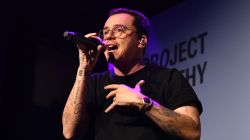
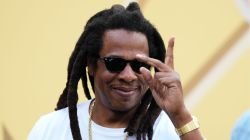
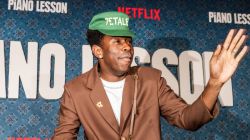
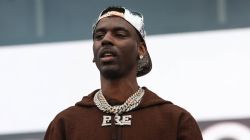
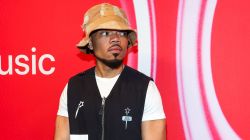




This was an inspirational read. Loaded with insight. Like this line:
Be careful of unnecessary humility. Dont be too humble. Dont be too humble that you hold yourself back from recognizing what you are.
Andres did his thing. Great work.
Haven’t bought any of his music, but that will change maybe this year.
politics in music isnt my thing..I guess its becuase I rarely agree with anything the artists are saying. Ive always been a fan of Ali though.
@bmoc
He said it doesn’t really talk politics, it deals more with social issues/community issues…so maybe you might like his next album!
First heard about Brother Ali a few months ago, I’m a mad fan since then. He has subject matter, lyrical ability, smooth flow and soul. One of the best from Rhymesayers, no doubt, working with Jake One is a just a big plus for me.
Go and Youtube him, it worth.
this nigga look like a villain from a bond movie! “goodbye…….mr bond!”
Great interview. One of my favorite artists speaking truth to masses. That’s what’s up!!
This has to be one of the best interviews I’ve read on hip hop dx so far. I’ve been a fan of Brother Ali since Shadown on the Sun and the passion for what he doesn is indisputable. I hope this interview reaches a lot of people. Loving Mr. Andres Vasquez. Really good job.
Excellent. Thanks to all for their time and effort in this piece.
Mac Dre was right in the hood you either fuck or you get fucked. R.I.P. Eyedea
DX, please take note, that was an interview, that’s the bar you should be reaching for. An important artist that people wanna hear from, speaking his mind on quality subject matter. I’m looking forward to Ali’s record.
Thanks for this interview. Great to hear from such an amazing guy that makes good quality hip-hop. Glad somebody still cares about people and not just themselves. Brother Ali thank you sir, you are my hero. Also I miss Eyedea, really really miss Eyedea.
Loved this interview.I met the brother twice.. both times he took the time to talk to me for e few minutes and take a picture. The energy and love that surrounds him are unique in this game. Can’t wait to see him again the 19th of may in antwerp!
This guy wants to be BLACK sooooooo bad…. hey brother Ali… dude your a pale white pozer… stop trying to be a black muslim!!
He’s albino. He has no real sense of race because he was universally unaccepted. He’s said so himself.
Unfortunate to see such unintelligent faggots make such strong judgments toward somebody who is more honest and unique than over 3/4 of the stupid fucking clowns they listen too.
Do some research before you assume a white looking guy, thats not eminem, is a wannabe anything…
Prolly the best interview I’ve read on this site…couldn’t stop reading until it was finished…phenomenal Q & A…really looking forward to the new album and the book of pics…nice to see this site supporting one of my favorite artists of the last decade….
Second that. That bit about Eyedea gave me chills. It’s cool to see him take that tragedy and really revitalize his commitment to real music and legitimate thought-provoking material. Rhymesayers all fucking day.
I came to say this guy looks like he’s from the future. lol
WHITE PURPLE YELLOW WE ALL FAM , WHICH MAKES HIM A BROTHER SO SHUT THE FUCK UP N LETS MOVE FORWARD N STOP SEEING COLOR.
The millionaires are always the focus. How to be a millonaire or how to date a millionaire , you should join ___RichMingle,C 0 ‘M___ to find the results. This is the best millionaire dating site for all doctors, lawyers, CEOs, Hollywood celebrities and professional models.
you cannot ever expect me not to see color and hold hands with the same people that enslaved me and treated me like dog shit for so many years
Amazing interview. I’m going to see Ali on 11th May, supported by Grieves and Budo.
Powerful statements led by great interviewing skills. Everything about this is thoughtful, insightful.
NOTE TO EDITOR: In Ali’s response to the first question in the “Brother Ali on ‘Writer’s Block'” section, there is a misplaced bracket in Jake One’s name.
Thanks!